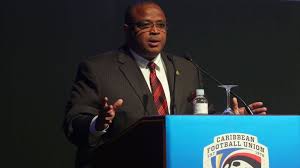By Paul Nicholson
April 14 – Caribbean Football Union president Gordon Derrick, barred yesterday from participating in the CONCACAF presidential election in May by FIFA’s ethics supremo Domenico Scala, could take his appeal to the Court of Arbitration for Sport (CAS).
The implications of barring Derrick could go far deeper into the CONCACAF management structure if he appeals, and especially if wins which, on the face of the evidence available, looks like he has a fair chance, though ‘fair’ could be the key word.
Derrick was barred by Scala from becoming a FIFA Vice President, an automatic position held by the elected president of CONCACAF. This bar means that he can’t participate in the election for the CONCACAF presidency as, presumably, he would be unable to fulfil his duties.
It is a politically convenient solution for the North American backers of Derrick’s rival, Canadian Victor Montagliani, as Derrick was a nailed-on favourite to win the election as he had the support of the majority of the Caribbean.
The story quickly becomes very reminiscent of the not-so-old FIFA politicking of the past where the battle for control sees deals done and allies burned as power gently shifts (or doesn’t) on international lines and the power of the institution helps manipulate a political objective.
The reason for Derrick’s FIFA bar from the election is given as being a reprimand dating from the Mohammed Bin Hammam cash-for-votes scandal in 2011, and an on-going but unspecified FIFA investigation into Derrick that began in March last year.
The cash-for-votes scandal in 2011 saw Bin Hammam hand out $40,000 in cash to Caribbean members in a bid to secure their vote in an upcoming presidential election against then incumbent Sepp Blatter.
The end result was a number of suspensions of Caribbean members as well as fines. Not all the Caribbean associations took the cash – the details of the attempted bribes were leaked from the Caribbean prompting investigation – and Derrick maintains that he was one. “We were sitting in the bar when we were told there was something to collect. We thought it was probably just a goodie bag of t-shirts or such like and said we would go by later. I never picked up an envelope of cash,” said Derrick.
Derrick was reprimanded for the incident – for obstructing the investigation – and fined SFr 300. The reprimand cannot be appealed under FIFA law (it is deemed too minor an infraction) but it seems it can be used as justification for banning election to FIFA office. It certainly doesn’t preclude an individual from holding CONCACAF office – Jamaica’s Captain Horace Burrell who was found guilty of taking the cash was suspended but is currently a senior vice president of CONCACAF.
How all this sits with a robust and fair FIFA/CONCACAF ethics process may be something for CAS to deliberate on, and could become a measure of their own independence.
The unspecified investigation into Derrick cited by Scala most likely relates to GOAL funding and to a loan secured by the Antigua and Barbuda federation from the Antiguan Commercial Bank. The loan was guaranteed against the federation’s training ground which FIFA was providing GOAL money to develop. FIFA had in fact conducted a prior investigation into GOAL funds in Antigua, an investigation conducted by Jerome Champagne when he was still a FIFA employee, and no misappropriation of funds was found.
However, FIFA rules do not allow projects they are funding being used as bank securities for further loans. This situation has been normalised.
For FIFA to ban Derrick suggests that there is something in this investigation that will warrant future sanction and begs the question of what does FIFA/Scala now know that it didn’t know before. But whether an unfinished investigation is enough to cause a failure to pass an integrity check is also a debatable point and unclear in the statues.
That the investigation was begun almost a year ago and not concluded has raised the suspicion that a longer game was being played and that the investigation could become a useful tool if required in the future – that time being now.
There is an irony in this situation that drills deeper into the CONCACAF administration and its new reform-focussed approach to life. In 2013 when CONCACAF was holding elections for a place on FIFA’s executive committee, US Soccer Federation president Sunil Gulati faced off against Mexican Federation president Justino Compean.
Before the election Derrick sent a letter to all the Caribbean member associations of the CFU in his capacity as president instructing them who to vote for in the upcoming CONCACAF elections and that Gulati was their representative. Compean was not even mentioned as running. Gulati won by one vote – reportedly the casting vote of then CONCACAF president Jeffrey Webb.
Insideworldfootball reported the letter at the time and later raised questions about US support for the Antigua and Barbuda federation. Those links were vehemently claimed by both parties as being totally above board and part of normal brotherly (and in this case some sisterly in the form of the supply of a female coach) support between a rich and poor football federation.
But with North American interests – and US in particular – now having taken a strong and not overly democratic grip on how CONCACAF is run, it seems the old alliances of the past are no longer required and the Caribbean in particular will lose its days in the sun.
Contact the writer of this story at moc.l1744973363labto1744973363ofdlr1744973363owedi1744973363sni@n1744973363osloh1744973363cin.l1744973363uap1744973363

